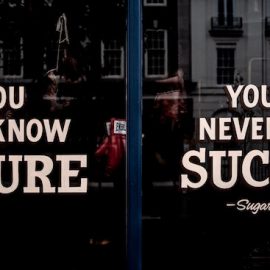

This article is an excerpt from the Shortform book guide to "The Winner Effect" by Ian Robertson. Shortform has the world's best summaries and analyses of books you should be reading.
Like this article? Sign up for a free trial here.
What shapes your ability to achieve and maintain success? How do your early-life influences affect your response to challenges and opportunities?
In his book The Winner Effect, Ian Robertson explores how your role models’ attitudes toward success influence your own approach. How you handle challenges, setbacks, and opportunities today comes, in part, from how your parents and teachers treated you and how they lived their own lives.
Read more to understand the power of role models in your life.
Your Role Models
One factor that shapes your ability to achieve, maintain, and build upon success is how you were influenced early in life by your parents and educators. Robertson explains that your role models’ attitudes toward success rubbed off on you, contributing to how you pursue and respond to success now.
(Shortform note: Maxwell Maltz (Psycho-Cybernetics) clarifies that while your role models did influence your approach to success, this doesn’t mean you automatically adopted their exact approach. You may have adopted an entirely different approach depending on how you identified with and felt about your formative experiences. For example, if your parents pushed you to excel academically, you could have identified with this experience in multiple ways—you might have appreciated them for wanting the best for you, or you might have felt angry with them for pressuring you. Whatever emotion you experienced now shapes your definition of success and the methods you choose to pursue it.)
Robertson distinguishes between different parenting and teaching styles, highlighting two key distinctions: 1) Did they praise efforts or talents? 2) Did they encourage autonomy or dependence?
1) Praising Efforts Versus Talents
According to Robertson, if your role models praised you for making an effort, regardless of the outcome of that effort, you likely developed the belief that your skills and abilities are malleable and that you can improve them by applying yourself. As a result, you probably have a positive and constructive attitude toward challenges, viewing mistakes and failures as learning opportunities—a perspective that helps you maintain motivation and overcome setbacks. For example, a young athlete praised for their perseverance in learning new techniques will likely attempt difficult maneuvers in practice, even if they’re not confident they’ll succeed, because they’ll see the challenge as an opportunity for growth.
Praising Talent Discourages Growth
On the other hand, Robertson explains, if your role models primarily praised your talents and your success each time you achieved something, you may have developed the belief that your skills and abilities are unchangeable parts of who you are. Likewise, you assume that your mistakes and failures indicate inherent limitations in your capabilities. And, because you don’t feel capable of surpassing your perceived limitations, you might shy away from opportunities that stretch your abilities or give up easily when tasks become difficult. For example, a student who is constantly told that they’re naturally gifted at math might avoid challenging problems, fearing that any mistakes will reveal that they’re not as smart as everyone thinks.
| How Praise Influences Habit Formation James Clear’s (Atomic Habits) research on habit formation offers insight into how early praise shapes behavior and long-term success. He distinguishes between three types of habits: goal-driven habits, system-driven habits, and identity-driven habits. 1) Goal-driven habits focus on achieving specific outcomes (like acing a test). Clear argues that while these can lead to short-term success, they often fail to create lasting change because they don’t address the underlying behaviors that lead to success. Instead, once you achieve the outcome, you lose the motivation to continue the behavior. Therefore, role models who primarily praise talents or achievements may inadvertently encourage children to focus on short-term goals rather than developing sustainable habits for long-term success. 2) System-driven habits focus on routines that support continuous improvement (like studying regularly). Clear suggests these are more effective for long-term success than goal-driven habits because they emphasize consistent actions rather than results. Therefore, role models who praise perseverance and effort reinforce the importance of consistent actions, teaching children that they’re capable of continuous improvement through persistence and hard work. 3) Identity-driven habits are rooted in self-perception (like being a good student). Clear argues these are the most powerful for driving long-term behavior change and success because they become part of who you are, not just what you do. Therefore, if role models praise effort—which helps their children adopt the identity of “capable learners”—their children will naturally develop capable, learning-driven behaviors that stick with them regardless of specific outcomes or challenges. |
2) Encouraging Autonomy Versus Dependence
According to Robertson, if your role models encouraged autonomy by guiding you to solve challenges independently, you likely developed problem-solving abilities that give you a sense of control over your life. As a result, you tend to take initiative and confront problems with a can-do attitude. For example, a child encouraged to make their own choices and deal with the consequences might grow into an adult who feels confident making major life decisions, such as changing careers or starting a business.
Overprotection Erodes Confidence
However, if your role models were overly protective and made most of your decisions for you, they may have undermined your confidence, preventing you from developing the skills needed to be accountable and manage challenges independently. And, according to Robertson, if you didn’t have the opportunity to exercise control over your life, you may attribute both successes and failures to external factors beyond your control. As a result, you might feel helpless when faced with obstacles, believing that you’re incapable of overcoming them. For example, a child whose parents constantly make decisions for them might grow into an adult who struggles to take initiative at work, always second-guessing their decisions and seeking approval from others.
| Attachment Theory: Secure Versus Anxious Attachment Attachment theory clarifies Robertson’s argument, suggesting that your sense of control as a child shaped your basic orientation to the world—and, consequently, your approach to success. Role models who let their children act autonomously while providing support when needed foster secure attachment: a stable sense of self and of safety in relationships. Children with secure attachment styles see the world as a safe place to explore, and understand themselves as capable individuals who can handle challenges. This fundamental sense of security about their place in the world leads to confidence in their judgment and ability to navigate new situations. Role models who are overly protective or controlling foster anxious attachment, marked by excessive dependence and fear of separation. Children with an anxious attachment style see the world as unpredictable or threatening and understand themselves as incapable of facing challenges alone. This fundamental insecurity about their place in the world leads to a persistent need for reassurance and difficulty in trusting their judgment. |

———End of Preview———
Like what you just read? Read the rest of the world's best book summary and analysis of Ian Robertson's "The Winner Effect" at Shortform.
Here's what you'll find in our full The Winner Effect summary:
- Why some people struggle to go after what they want in life
- The five interrelated factors that shape your ability to achieve
- How your parents and educators play a huge role in your future success






